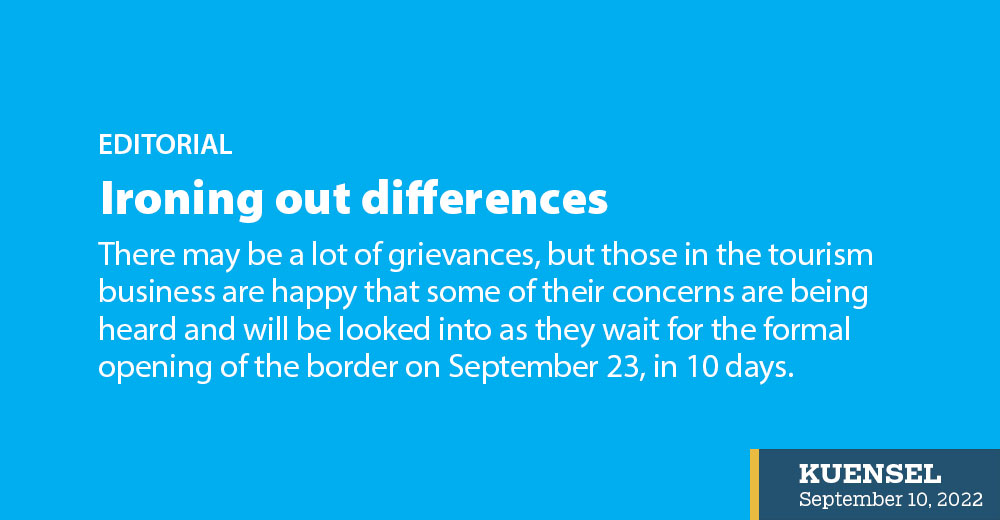There may be a lot of grievances, but those in the tourism business are happy that some of their concerns are being heard and will be looked into as they wait for the formal opening of the border on September 23, in 10 days.
The sustainable development fee (SFD) of USD 200 cannot be changed. It is inscribed in the Tourism Levy Act 2022. What could be done is iron out issues which tour operators feel are unnecessary. There are some rules that need to be relooked into without affecting the overall vision of “high value-low volume” or making Bhutan a “high-end” destination.
One is the age of vehicles used for tourists and the age of drivers. The third meeting of the Council on September 8 agreed to abide by road safety authority’s rules and do away with the seven-year age limit for tourist vehicles. The decision awaits the approval of a steering committee and the Cabinet. The age of drivers and vehicles will not hamper the service. Tour operators need no rule to provide the best services to tourists. They have to live up to the expectations of the visiting guests.
A safe, comfortable vehicle with a well-mannered English-speaking and non-doma chewing driver is already a priority for most operators. If, like one said, tourist are not visiting Bhutan to travel in SUVs, their comfort and safety is an important yardstick of their service. The government imposing vehicle age limit is also ironic when they sell second hand, thoroughly used or misused pool vehicles, some as old as 20 years, through public auctions. If the concern is safety, the lives of Bhutanese are as precious as that of a dollar-paying tourists.
The SDF is expected to help achieve the low-volume vision by restricting the number of visitors. Other rules should help tour operators and the hoteliers. Testing and validating the competency of tour guides, keeping tourists in TCB-certified hotels and the business bond are some rules that will help both tourist and service providers. The old days of calling a lake Guru Rinpoche’s swimming pool are over. Guides should be well-versed not only on monuments but also on issues the country is facing or even provide perspectives on global issues.
Once the tourists start arriving after the much-hyped “high-end” destination tag, there will be expectations worth USD 200 per day. A lot of things that we take casually – bumpy roads, overflowing sewage, barking dogs and answering nature’s call in the open – will affect the business and the brand. Our “systems” (online services) should be up and running all the time. A guest at a five-star hotel recently told the staff he was concerned for the hotel when the staff apologised for the false fire alarm that went off twice after midnight.
Tourists may not start arriving as soon as the border is opened. But there is not much time and lots to do. Some rules decided and announced are not implemented. Entry points in the south, except in Phuentsholing, are not ready even after announcing that they will be opened for tourists.
At the Council meeting, the chairman of the TCB, had said that the rules are not carved in stone and could be changed depending on the situation and how we progress. There is a lot to be ironed out and room for change as we wait for tourists.


